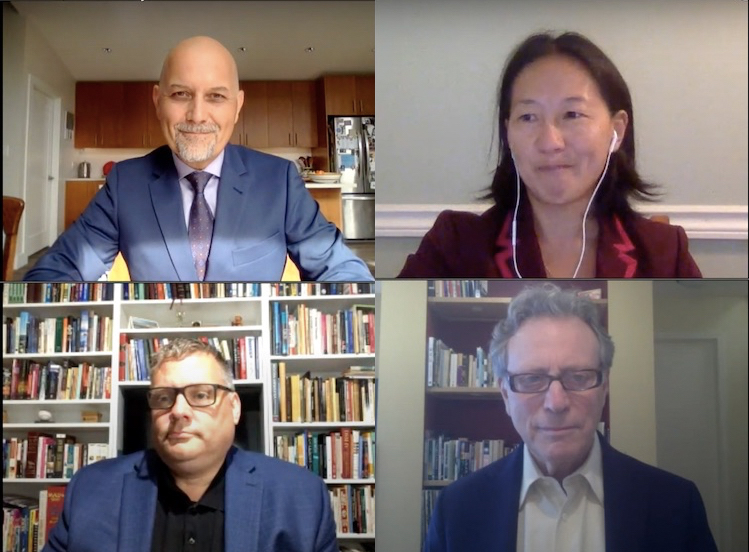Candidates from British Columbia’s three major political parties took to the virtual stage Thursday morning for a debate about climate change, business and the economic future ahead of the provincial election on Oct. 24.
The event put NDP Environment Minister George Heyman firmly on the defensive as the BC Greens’ Adam Olsen and the BC Liberals’ Peter Milobar found a surprising bit of common ground against the incumbent party.
The discussion was put on by the Catalyst Business Alliance, a network of Canadian companies in favour of strong climate and energy policy, and the Pembina Institute, a non-profit think tank that supports a transition to clean energy.
With questions posed by a panel of business leaders — representatives from Arc’teryx, Modo, Carbon Engineering and Innergex Renewable Energy — the forum showcased how the parties are attempting to balance strong climate commitments with a realistic vision for rebuilding the economy in the midst of COVID-19.
The debate covered a breadth of topics that British Columbians have been eager to get more information on going into the election, including how exactly the CleanBC plan will meet its ambitious targets, how LNG Canada factors in, and what the parties’ plans are to support reconciliation with Indigenous people.
The opening remarks set a clear tone about where each candidate stood going into the debate.
Milobar used his time to criticize the NDP for calling an election, while Heyman fired back by emphasizing the “falling backwards” on climate policy he said occurred under former BC Liberal premier Christy Clark, whose government fell to the NDP three years ago.
“I think we were all frustrated between 2011 and 2017,” Heyman added.
Olsen, who was interim BC Green leader before Sonia Furstenau’s election in September, made it clear that the Greens would not stand for anything less than ambitious, environment-first policy and full transparency from their peers.
He was comfortable pointing out his discontent with certain NDP decisions, even with the knowledge that the Greens held the balance of power in the New Democrat minority government.
“Surely we can agree that there is a need to drastically and immediately decarbonize, lest we beget risk of extreme flooding, massive fires, extreme heat, extreme storm events, long-term droughts, ecosystem collapse and species extinction due to climate change,” Olsen said. “The situation in front of us is an urgent crisis, both a critical threat and an opportunity for B.C.’s economy.
“The BC Greens, frankly, had to drag the BC NDP kicking and screaming to do this work.”
Anna Stukas, vice-president of business development for carbon-capture firm Carbon Engineering, told the candidates that lower greenhouse gas emission targets were great, but that they need to be paired with a plan for action.
She asked what candidates would do to enact CleanBC, the province’s flagship plan to address climate change released with the backing of the Greens in 2018 — and beyond that, how they would take emissions down to net-zero.
Milobar ducked the question, saying that the BC Liberal platform will be released in the next few days and that it would include provisions to address emission levels.
“The reality is climate needs action; it does not need a fancy document,” he said.
Heyman said that he was keen to focus on clean technological advancements that would help remove or sequester carbon from the environment, as well as work with the commercial transport industry to lower emissions and encourage a provincewide uptake in clean vehicles.
Olsen retorted that the Greens were behind much of the current government’s green policies, saying that there has been a stunning lack of recognition by the NDP members of the collaborative work done.
“Every single policy that George [Heyman] mentions came to these [CleanBC] plans because the Greens brought them there,” he said.
Olsen added that his party is fully committed to stopping subsidies for the fossil fuel industry and putting a halt to liquefied natural gas production in the province.
On several questions, the Greens’ Olsen and the Liberals’ Milobar seemed to firmly agree that the NDP has not been doing enough on climate change, but they diverged on how the situation should be approached.
Chris Heysel, environmental impact lead at Arc’teryx and one of the forum panelists, asked the candidates about how their parties would include reconciliation with Indigenous peoples into a clean energy plan for the whole province.
Both Olsen and Milobar used the opportunity to heap criticism on the NDP.
Heyman wanted to immediately clarify that a commitment to the United Nations Declaration on the Rights of Indigenous Peoples was a part of the BC NDP’s 2017 platform and did not come from the BC Green Party.
Milobar called this an “astounding” answer. He immediately brought up Bill 17, the Clean Energy Amendment Act, to vigorous nodding from Olsen — both the BC Liberals and the BC Greens are against the bill.
Bill 17 is an amendment to 2010 legislation that would remove the provision that B.C. needs to be electrically self-sufficient, allowing the province to import cheap electricity from the U.S.
The Greens have voiced concerns that the bill could be disastrous for First Nations that have already invested in renewable energy projects.
The bill will decimate Indigenous peoples’ ability to get into green energy while providing no opportunity for consultation, Milobar insisted.
Olsen agreed, saying that the New Democrats threw Indigenous peoples “right under the bus” with the bill.
“I need to be clear here that we are in this debate today because the BC NDP tore the house down around them, because they weren’t able to get support for Bill 17 and Bill 22 when they were brought forward,” Olsen said, calling it an “egregious act” against UNDRIP.
Bill 22 is the Mental Health Amendment Act, which would permit youth to be detained after an overdose. The government paused the legislation after significant negative feedback.
Moderator Karen Tam Wu, co-chair of Catalyst Business Alliance, then asked the candidates questions that were submitted by the audience.
The first audience question came from a person who said it was a topic that was clearly top-of-mind for most viewers: Do candidates think B.C. can develop an LNG industry and meet its emissions targets?
Any camaraderie between the BC Greens and the BC Liberals quickly evaporated with the mention of the $40-billion LNG Canada project, potentially the largest private infrastructure project in Canadian history and a polarizing topic in the province.
The project includes the 670-kilometre Coastal GasLink pipeline that will run from Dawson Creek to Kitimat.
According to a July report from the Canadian Centre for Policy Alternatives, increasing production for LNG would add a total of 13 megatonnes per year to the province’s output, and including the project, emissions from oil and gas production would exceed B.C.’s 2050 target by 160 per cent, even if emissions from the rest of the economy were reduced to zero by 2035.
In his opening remarks, Olsen called LNG a “generational sellout,” and pointed out that every member of the BC Liberals and the BC NDP had voted unanimously all 14 times in favour of Bill 10, which introduced tax breaks for the LNG industry.
He raised the point again in response to the audience question as Heyman and Milobar struggled to define how they would ensure emissions goals would be met without acknowledging the impact the project would have on B.C.’s ability to meet its climate emissions targets.
On whether B.C. can develop an LNG industry and meet its emissions targets, Olsen said, “The answer is no. You can’t have your cake and eat it too, and that’s part of the dishonesty in this conversation that I’ve been referring to today.”
In response, Heyman, who has been environment minister as LNG expanded in B.C., argued that “any LNG proposal going forward has to show how it will fit within the climate plan,” and that the BC NDP won’t expect every other industry to make up for the increase in emissions that LNG will cause.
Milobar capped the answers off by insisting that the disdain from the BC Greens was disingenuous, and that the party, while in partnership with the BC NDP, took “the carrot of CleanBC” rather than truly push back on LNG.
Other audience questions highlighted concerns such as protecting communities from severe weather conditions, enforcing policies against corporations while protecting small business in the province, and helping rural communities transition to a clean economy. The full video of the virtual forum can be viewed here.
On Oct. 15, there will be another climate debate, this time between the BC NDP’s Heyman, BC Liberal environment critic Greg Kyllo and BC Green Leader Furstenau. ![]()
Read more: Energy, BC Election 2020, BC Politics, Environment
















Tyee Commenting Guidelines
Comments that violate guidelines risk being deleted, and violations may result in a temporary or permanent user ban. Maintain the spirit of good conversation to stay in the discussion.
*Please note The Tyee is not a forum for spreading misinformation about COVID-19, denying its existence or minimizing its risk to public health.
Do:
Do not: